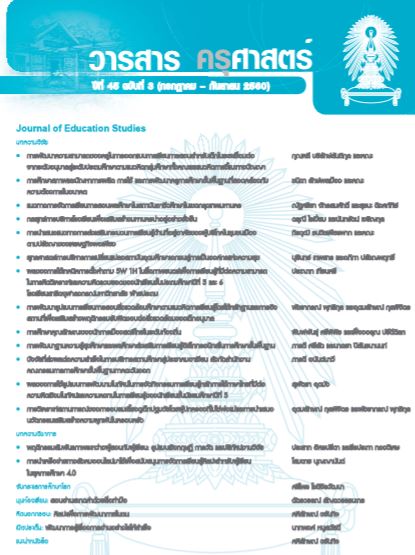การวิเคราะห์สถานการณ์ของการอบรมเลี้ยงดูเด็กปฐมวัยโดยผู้ปกครองที่ไม่ใช่พ่อแม่ และการนำเสนอนวัตกรรมเสริมสร้างความผูกพันในครอบครัว
Keywords:
สถานการณ์ของการอบรมเลี้ยงดูเด็กปฐมวัย, นวัตกรรมเสริมสร้างความรักความผูกพันในครอบครัว, เด็กปฐมวัย, ผู้ปกครองที่ไม่ใช่พ่อแม่, SITUATION OF NON-PARENTAL CARE FOR YOUNG CHILDREN, INNOVATIVE APPROACH TO ENHANCE ATTACHMENT IN FAMILY, YOUNG CHILDREN, NON-PARENTAL CAREGIVERAbstract
การวิจัยมีวัตถุประสงค์เพื่อ 1) วิเคราะห์สถานการณ์การอบรมเลี้ยงดูเด็กปฐมวัย โดยผู้ปกครองที่ไม่ใช่พ่อแม่ และ 2) นำเสนอนวัตกรรมการอบรมเลี้ยงดูเพื่อสร้างความผูกพันกับเด็กต่ำกว่า 2 ปี ด้วยกระบวนการวิจัยเชิงปฏิบัติการแบบมีส่วนร่วมของชุมชน เก็บรวบรวมข้อมูล 2 ระยะ ระยะที่ 1 ศึกษาสถานการณ์ ผลกระทบ และแนวทางการส่งเสริมสวัสดิภาพ คุ้มครองและพัฒนาศักยภาพเด็กปฐมวัย ระยะที่ 2 พัฒนานวัตกรรมเสริมสร้างความผูกพัน กลุ่มตัวอย่าง คือ เลี้ยงดูเด็กปฐมวัยที่ไม่ได้อยู่กับพ่อแม่ 264 คน จาก 4 ภูมิภาค และตัวแทนเจ้าหน้าที่จากหน่วยงานที่เกี่ยวข้อง จำนวน 27 คน ผลการวิจัยพบว่า 1) การอบรมเลี้ยงดูเด็กปฐมวัยที่ไม่ได้อยู่กับพ่อแม่มียายเป็นผู้เลี้ยงดูเด็กปฐมวัยมากที่สุด สาเหตุหลักของการเลี้ยงดูเด็กโดยบุคคลอื่นคือการย้ายถิ่นไปทำงานในเขตเมืองของพ่อแม่ และการหย่าร้าง พ่อแม่สามารถเลี้ยงบุตรหลังคลอดได้เพียงสามเดือนแรกเท่านั้น ผู้เลี้ยงดูเด็กต้องการให้มีข้อมูลทะเบียนครอบครัวและศูนย์เลี้ยงดูเด็กในชุมชนเป็นที่ต้องการมากที่สุด และควรจัดให้ความรู้เรื่องการเลี้ยงดูเด็กปฐมวัยโดยศูนย์พัฒนาครอบครัว 2) คู่มือนวัตกรรมเสริมสร้างความผูกพันประกอบด้วยชุดเอกสารให้ความรู้ผู้เลี้ยงดูเด็กต่ำกว่า 3 ปี และกิจกรรมการเล่นและเกมปฏิสัมพันธ์
The objectives of this study were 1) to conduct a situation analysis of non-parental care for young children, and 2) to propose an innovative non-parental care approach that enhances attachment with young children under two years old. Participatory action research method was used in the study. Data collection was conducted in 2 phases. Phase 1 included a survey, home visits, and focus groups. Phase 2 was the development of a non-parental care innovative approach to enhance attachment. There were 264 samples of non-parental care for young children from four regions of Thailand and 27 officers involved. The findings were as follows: 1) Most care providers were grandmothers; non-parental care chosen was due to job-migration; postnatal care was possible for only three months; the most needed choice was a community child development centre with a registration system for non-parental care; the Community Family Development Center should also organize parent education on child rearing activities. 2) A proposed manual of an innovative approach to enhance attachment in families comprised of a set of educating documents on parenting under threes, including play and interaction game activities.




